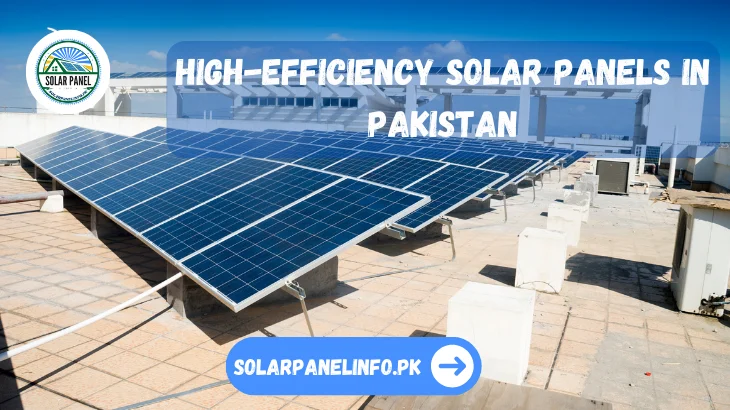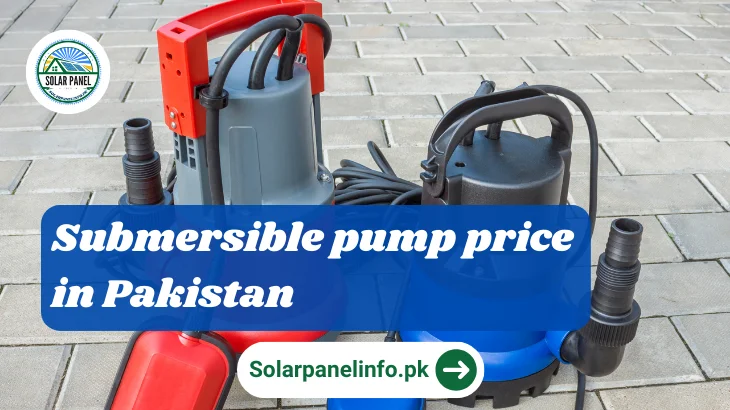High-efficiency solar panels in Pakistan
Solar panels are increasingly being adopted as a reliable home energy source, largely due to escalating energy prices, attractive tax incentives, and a growing emphasis on sustainability. Suppose you are considering the most efficient solar panel for your home energy needs. In that case, our experts at CNET have researched and identified the leading options that boast the highest efficiency ratings. Here we will discuss the High-efficiency solar panels in Pakistan.
Read more: Solar Panel Companies in Pakistan

توانائی کی بڑھتی ہوئی قیمتوں، پرکشش ٹیکس مراعات، اور پائیداری پر بڑھتے ہوئے زور کی وجہ سے سولر پینلز کو گھروں کے لیے توانائی کے قابل اعتماد ذریعہ کے طور پر تیزی سے اپنایا جا رہا ہے۔ اگر آپ اپنی گھریلو توانائی کی ضروریات کے لیے سب سے زیادہ موثر سولر پینل پر غور کر رہے ہیں، تو CNET کے ہمارے ماہرین نے تحقیق کی ہے اور سرکردہ آپشنز کی نشاندہی کی ہے جو اعلیٰ کارکردگی کی درجہ بندی پر فخر کرتے ہیں۔
What is solar panel efficiency?
Solar panels vary in efficiency ratings, which indicate how effectively they convert sunlight into usable electricity. Higher efficiency means more electricity generated from the same sunlight, potentially lowering energy costs over time. For example, some panels are 20% efficient, while others, like the Maxeon 7, can reach nearly 25% efficiency. When choosing solar panels, homeowners must balance cost, efficiency, and aesthetics while also considering the availability of equipment from their installer. A ranking of the most efficient solar panels was conducted based on specifications available as of mid-April 2024, highlighting the importance of efficiency in residential solar installations.
Best overall: Maxeon 7
Currently, the most efficient residential solar panel is the Maxeon 7, which surpassed the previous Maxeon and Canadian Solar panels upon its release in February 2024. Maxeon has consistently led the industry in terms of solar panel efficiency, and its latest model has received confirmation of its record efficiency figures from the National Renewable Energy Laboratory. The lab-recorded efficiency level of 24.9% converts to approximately 24.1% in real-world conditions—essentially what you would expect from panels installed on your roof.
However, there is a drawback for solar buyers in the U.S.: the Maxeon 7 will not be offered in the American market until later this year, meaning it won’t be available for any solar systems you may be setting up right now. Additionally, it’s important to highlight that Maxeon announced a restructuring of its business in November, stating, “The Company intends to concentrate solely on the U.S. market, where its market presence and planned local manufacturing capabilities form a solid foundation for promoting growth and profitability.
New developments: JinkSolar, Longi Green, and Trina Solar
Maxeon is no longer the only manufacturer of high-efficiency residential solar panels. Jinko Solar has introduced its Tiger Neo 3.0 panels with an efficiency rate of 24.8%, closely following Maxeon 7. The Tiger Neo 3.0 comes in a 495-watt version for residential use and a 670-watt version for utilities. Longi Green Energy has set a world record with its hybrid passivated back contact 2.0 module at 25.4% efficiency, but it is currently only available for commercial use. Trina Solar has achieved a record 27th time with an N-type TOPCon cell reaching 25.9% efficiency, while a lab from the Fraunhofer Institute has achieved 26.1% efficiency in a proof-of-concept TOPCore solar cell. Both sides-contacted solar cells could potentially reach up to 27% efficiency in the future.
Most efficient solar panels of 2025
Maxeon 7 445-watt(میکسیون 7 445 واٹ)
Most efficient overall: 24.1% efficiency
Maxeon’s latest residential solar panel is the most efficient one available. It outperforms its closest competitors by one full percentage point. Additionally, it has a temperature coefficient of -0.27%, meaning it doesn’t lose efficiency as quickly when temperatures rise. Maxeon also offers a strong production guarantee, stating that its panels will still operate at 92% capacity after 25 years.
Canadian Solar TOPHiKu6 470-watt(کینیڈین سولر TOPHiKu6 470 واٹ)
23% efficiency
Canadian Solar offers an impressive 470-watt model of its HiKu6 panel, making it the highest wattage panel you’ll find on this list! As the panels in this series grow larger, they become even more efficient. The HiKu6 boasts a temperature coefficient of -0.29% and comes with a fantastic 25-year guarantee, ensuring you’ll get at least 89.4% of its original production. While it’s slightly behind Maxeon’s top performance, it’s still a great choice!
Read more: Canadian Solar panel prices in Pakistan
Maxeon 6 440-watt(میکسیون 6 440 واٹ)
22.8% efficient
Maxeon previously sold its solar panels in the United States through SunPower and its subsidiary, Blue Raven. However, now that their exclusive partnership has ended as of March, they may begin selling through additional installers. The efficiency rating of the Maxeon 6 matches what was once considered the highest standard. Additionally, its temperature coefficient and production warranty are on par with those of the Maxeon 7.
Maxeon 3 430-watt(میکسیون 3 430 واٹ)
22.7% efficient
Maxeon’s third entry on the list has an energy coefficient of -0.27% and a maximum degradation of 8% over 25 years.
REC Alpha Pure RX 470-watt
22.6% efficient
With a temperature coefficient of -0.24%, REC’s Alpha Pure panel exhibits the best performance in terms of retaining production at elevated temperatures compared to other panels. Generally, larger solar panels tend to be more efficient than their smaller counterparts, and this model ranks among the largest on our list. It comes with a guarantee to generate 92% of its original capacity even after 25 years.
Qcells Q.Tron BLK M-G2+ 440-Watt
22.5% efficient
Q-Cells is the most popular brand of residential solar panels in the United States. Their latest panel is the most efficient one they have ever made. It has a temperature coefficient of -0.3% and comes with a 25-year guarantee that it will produce at least 90.58% of its rated energy output.
Tiger Neo N-Type 54HL4R-(V) 450-watt
22.5% efficient
The Tiger Neo panel has a maximum efficiency rating of 22.52% and a temperature coefficient of -0.29%. Jinko guarantees that after 30 years, the panel will produce 86.54% of its original capacity. Finding the most efficient solar panels is straightforward. You can look at manufacturer data sheets to find efficiency ratings. Today, these ratings are higher than in the past and continue to increase. According to the Lawrence Berkeley National Laboratory’s Tracking the Sun report, 2021 was the first year that over half of the residential solar panels installed in the US had efficiency ratings above 20%. Ten years ago, only 0.6% of installed panels met that standard.
Other solar panels we evaluated
If you’re searching for the most efficient solar panel for your roof, here’s how the leading brands compare.
Most efficient residential panels(سب سے زیادہ موثر رہائشی پینل)
| Company | Panel and capacity | Max. efficiency rating | Wattage | Temperature coefficient |
| Maxeon | Maxeon 7 | 23.5-24.1% | 435-445 | -0.27 |
| Canadian Solar | TopHiKu6 CS6.1-54TD | 21.8-23% | 445-470 | -0.29 |
| REC | REC Alpha Pure RX | 21.6-22.6% | 450-470 | -0.24 |
| Jinko Solar | Tiger Neo N-type 54HL4R-(V) | 21.52-22.52% | 430-450 | -0.29 |
| Qcells | Q.Tron BLK M-G2+ | 21.3-22.5% | 415-440 | -0.3 |
| Panasonic | Evervolt HK2 Black | 21.7-22.2% | 420-430 | -0.24 |
| Silfab | SIL-420/430 QD | 21.5-22.1% | 420-430 | -0.29 |
| JA Solar | JAM54S30/GR | 20.5-21.8% | 400-425 | -0.35 |
| ZNShine Solar | ZXM7-SH120 Series | 20.35-21.55% | 440-465 | -0.35 |
| Longi | Hi-MO 5m | 21.30% | 410-420 | -0.34 |
| Trina Solar | Vertex S TSM-DE09C.07 | 19.8-21.1% | 380-405 | -0.34 |
How efficient are solar panels?
The efficiency of solar panels can vary widely. The most efficient solar panels on our list achieve over 24% efficiency, meaning they convert more than 24% of the sunlight’s energy into usable electricity. However, not all solar panels reach this level; the ones you choose may have lower efficiency. It’s important to consider not just the efficiency rating, but also the overall expected output of your solar panel system relative to its cost.
It’s worth noting that these panels represent the most efficient options for residential use. There are also experimental technologies and panels designed for commercial and utility-scale applications that can achieve even higher efficiencies.
What affects solar panel efficiency?
The numbers provided are derived from controlled laboratory tests. However, in actual conditions, various factors can lead to less energy output than a solar panel’s efficiency rating might indicate.
Sunlight(سورج کی روشنی)
When the weather is overcast or cloudy, the amount of sunlight that reaches the solar panels decreases, resulting in lower electricity production than anticipated.
Solar Panel Angle(سولر پینل اینگل)
While solar panels can function when oriented in different directions, their efficiency is maximized when installed at an optimal angle, which varies based on geographic location.
Other Electrical Components(دیگر برقی اجزاء)
The flow of electricity is not direct from the panels to appliances. There can be energy losses along the way due to the inverter and other electrical components.
Temperature(درجہ حرارت)
The performance of solar panels is also influenced by temperature. As the temperature rises, energy production may decline, although this decrease is not uniform. The temperature coefficient of a solar panel indicates the extent of efficiency loss for each degree Celsius (or 1.8 degrees Fahrenheit) above 25°C (77°F).
For instance, at 26°C (79°F), a REC Alpha Pure panel would generate 0.24% less energy compared to its output at 25°C. By the time it reaches 29°C (84°F), the production loss would be just under 1%.
Solar panel efficiency by type
There are three primary types of solar panels, each with distinct efficiency rates for converting sunlight into electricity. Here’s an overview of these types:
Monocrystalline Solar Panels(مونوکرسٹل لائن سولر پینلز)
Known for their high efficiency, monocrystalline panels are crafted from a single silicon ingot that is sliced into thin wafers. Their efficiency ranges from 17% to 22%, making them the most effective option available. However, they are also on the pricier side, typically costing between $1 to $1.50 per watt. Due to their performance, monocrystalline panels are the most commonly installed type in residential solar systems today.
Polycrystalline Solar Panels(پولی کرسٹل لائن سولر پینلز)
These panels are made from multiple silicon crystals and generally have a lower efficiency rate of 15% to 17%. They are more budget-friendly, with prices usually ranging from 90 cents to $1 per watt, making them an accessible option for many consumers.
Thin-film Solar Panels(پتلی فلم سولر پینلز)
Thin-film panels are less expensive but tend to be the least efficient, with an efficiency range of 10% to 13%. They are primarily used in commercial installations due to their lower cost, which usually falls between $1 and $1.50 per watt.
Each type of solar panel has its advantages and considerations, making it important to choose based on specific needs and budget.
Is solar panel efficiency important?
When choosing solar panels, higher-efficiency options are generally more costly but may be preferable depending on various factors such as financial goals, brand, and aesthetics. According to experts, the main consideration for consumers should be the economic benefits of the panels. For those with limited space, such as tiny homes, high-efficiency panels can maximize energy output. However, in some cases, community solar subscriptions may be a more financially advantageous option.
Can solar panels be 100% efficient?
The panels mentioned here are not the highest-efficiency solar panels available; they are simply those that are sold commercially for residential use. Studies on solar cells (the parts of solar panels that generate energy) have achieved significantly greater efficiencies in laboratory settings. The National Renewable Energy Laboratory monitors the top efficiencies reached under standardized testing conditions. The record for the highest solar cell efficiency was set at 47.6% in June 2022.
What should I consider when choosing a solar panel company?
- There is no universal solar setup; obtaining multiple quotes (3-5) from different installers is essential before making a decision.
- Understand your energy usage and goals (completely replacing energy, saving money, etc.) to measure competing quotes effectively.
- Choose installers with respected third-party credentials, such as those certified by the North American Board of Certified Energy Practitioners.
- Installers should assess your roof condition to avoid additional costs later and transparently explain their system design proposals.
- The quality of the installer is crucial for maximizing energy production through proper installation techniques.
How we chose and ranked the most efficient solar panels
The panels listed here were selected because they are among the most frequently installed options and are likely to be included in quotes for solar installations. If you receive a quote for panels not found on this list, you can verify their efficiency rating and other specifications in the same manner I did. Here’s how to do it.
Manufacturers of solar panels provide data sheets that contain information about dimensions, performance metrics, and their internal chemistry. If your solar provider fails to give you these sheets, you can access them by clicking on the company name in the table above. (Many of the links direct you to PDFs.) From there, it becomes a straightforward process of comparing the statistics.
Conclusion
When selecting a solar panel for your home, efficiency is a crucial factor to consider. The most efficient solar panels, such as the Maxeon 7, can achieve up to 24.1% efficiency. This higher efficiency means more energy production from the same amount of sunlight, which can significantly reduce long-term energy costs. However, it is essential to take into account other factors, such as cost, temperature coefficient, and warranty, alongside efficiency. For those in Pakistan, choosing the right panel involves balancing these factors with local availability and options for installation.
اپنے گھر کے لیے سولر پینل کا انتخاب کرتے وقت، کارکردگی پر غور کرنے کا ایک اہم عنصر ہے۔ سب سے زیادہ موثر سولر پینلز، جیسے میکسیون 7، 24.1 فیصد تک کارکردگی حاصل کر سکتے ہیں۔ اس اعلی کارکردگی کا مطلب سورج کی روشنی کی اتنی ہی مقدار سے زیادہ توانائی کی پیداوار ہے، جو طویل مدتی توانائی کے اخراجات کو نمایاں طور پر کم کر سکتی ہے۔ تاہم، کارکردگی کے ساتھ ساتھ دیگر عوامل، جیسے لاگت، درجہ حرارت کے قابلیت، اور وارنٹی کو بھی مدنظر رکھنا ضروری ہے۔ پاکستان میں رہنے والوں کے لیے، صحیح پینل کا انتخاب کرنے میں ان عوامل کو مقامی دستیابی اور تنصیب کے اختیارات کے ساتھ متوازن کرنا شامل ہے۔
FAQ’s
What is solar panel efficiency?
Solar panel efficiency is the percentage of sunlight converted into usable electricity, and higher efficiency results in more energy production from the same amount of sunlight.
What affects solar panel efficiency?
Factors such as temperature, sunlight availability, panel angle, and the quality of other electrical components can all impact a solar panel’s performance.
Can solar panels ever be 100% efficient?
Current solar panels are not 100% efficient, with the highest laboratory efficiency recorded at 47.6%. Commercial panels usually have efficiencies between 20% and 25%.


